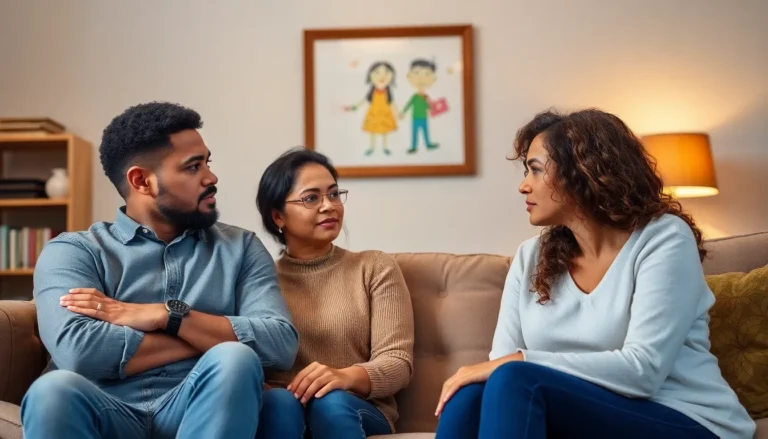Table of Contents
ToggleIn a world filled with influencers and reality stars, finding a true positive role model can feel like searching for a needle in a haystack. Yet, these unsung heroes can inspire greatness and spark change in ways that even the most glamorous celebrity can’t. They show us that success isn’t just about fame or fortune; it’s about character, resilience, and the ability to lift others up.
Understanding Positive Role Models
Finding genuine positive role models is essential in today’s world filled with influencers. True heroes inspire others and cultivate essential qualities like resilience and character.
Definition and Characteristics
Positive role models demonstrate integrity and authenticity. They represent values such as honesty, empathy, and perseverance. Individuals often admire them for their ability to overcome obstacles. They encourage others to pursue their goals and embrace challenges. Characteristics of a positive role model include effective communication skills and a supportive nature. They empower those around them to be their best selves and to aspire for greatness.
Importance in Personal Development
Positive role models significantly influence personal growth. They serve as examples for individuals seeking guidance during difficult times. Inspiration drawn from them can lead to increased motivation and improved self-esteem. By observing their behavior, people learn valuable life lessons. The presence of a role model enhances decision-making abilities and nurtures ambition. Their impact on developing character traits cannot be overstated, as they help individuals understand the importance of resilience and compassion.
Types of Positive Role Models

Positive role models come in various forms, each offering unique attributes that inspire and uplift others. Exploring these types reveals valuable traits that can significantly impact personal development.
Family Members
Family members often serve as the first positive role models. Parents, siblings, and grandparents exemplify qualities such as love, support, and resilience. They provide a safety net during challenging times, demonstrating the power of perseverance and empathy. By sharing life experiences, family members instill values like respect and integrity, crucial for personal growth. Their influence shapes character early on, offering foundational lessons in compassion and responsibility.
Teachers and Educators
Teachers and educators play a vital role in shaping young minds. These individuals inspire a passion for learning and instill critical thinking skills in students. They often demonstrate commitment, patience, and enthusiasm, encouraging students to pursue their dreams. An effective educator fosters a supportive environment, empowering students to overcome obstacles. Positive interactions with educators often lead to increased self-esteem and a greater appreciation for knowledge, which lays the groundwork for lifelong learning.
Public Figures
Public figures also exemplify positive role models in society. Activists, athletes, and artists often use their platforms to inspire change. They demonstrate authenticity, dedication, and resilience while facing challenges. When public figures advocate for social justice, health, or education, they create awareness and motivate others to take action. Their visible commitment to causes often resonates with individuals, leading to increased ambition and a desire to contribute positively to society.
The Impact of Positive Role Models
Positive role models significantly shape individual lives and societal dynamics. They inspire change and foster development through their actions and principles.
Psychological Benefits
Psychological benefits arise when individuals engage with positive role models. Increased self-esteem results from these interactions, as people often see reflections of their potential in others. Motivation thrives in environments surrounded by supportive mentors. Resilience strengthens, too, as role models demonstrate how to navigate challenges effectively. Individuals frequently adopt behaviors of those they admire, leading to personal growth and enhanced goal commitment. Their success stories serve as powerful reminders that overcoming obstacles is possible.
Social Influence
Social influence plays a critical role in how positive role models reshape communities. They create environments encouraging collaboration and compassion among peers. Families and teachers visibly impact children through modeling essential life skills. Public figures advocate for justice and equality while inspiring societal change. Local heroes build a sense of belonging and purpose, uniting diverse groups through shared values. Positive role models challenge societal norms, promoting discussions about growth and empowerment. Their actions ripple through communities, instilling hope and aspiration in future generations.
How to Identify and Seek Positive Role Models
Finding positive role models starts with recognizing the qualities that inspire personal growth and resilience. Individuals can pursue several methods to identify these mentors.
Self-Reflection
Self-reflection plays a crucial role in recognizing the traits one admires. Individuals should consider their values and aspirations, assessing what characteristics resonate with them. Identifying those qualities guides the search for role models who embody them. A person might ask themselves questions like, “What values inspire me?” or “Who makes me feel motivated?” This introspection sharpens awareness and fosters a deeper connection with potential mentors. Discovering personal strengths and weaknesses also helps focus efforts on learning from those who exemplify resilience and compassion.
Community Engagement
Engaging with the community opens doors to positive role models. Volunteering, attending local events, or joining clubs exposes individuals to those who make impactful contributions. Community members often embody qualities such as kindness and dedication. These interactions can lead to discovering personal mentors who share similar goals and values. Listening to their stories or participating in discussions enhances understanding and inspiration. Individuals often encounter genuine role models in everyday life through community connections, reinforcing their commitment to personal and collective growth.
Positive role models play a crucial role in shaping individuals and communities. They embody qualities that inspire growth and resilience while fostering environments of support and compassion. By recognizing and engaging with these role models, individuals can cultivate their own paths to success.
Finding mentors who reflect personal values can lead to transformative experiences. Whether it’s a family member, teacher, or public figure, the influence of a positive role model can ignite ambition and instill essential character traits.
Encouraging connections with such figures not only enhances personal development but also contributes to a more supportive society. Embracing the lessons learned from positive role models can empower future generations to strive for greatness and uplift others along the way.







